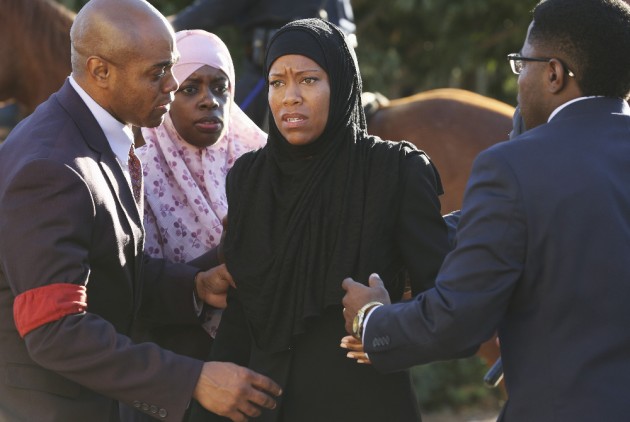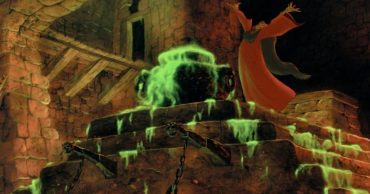
Visually, the final sequence of “Episode Eight” is pretty arresting. And for the most part, American Crime does a solid job building to that climatic moment, with tensions on both sides of the tragedy reaching a boiling point – and then crossing over into something deeper, causes that take the event out of their hands and run away with it, leaving those trying to get over the deaths of family members stuck in between a personal tragedy and a inter-cultural conflict, with both sides losing sight over what matters as other, more sinister forces begin bearing down on these families. There’s no denying the power behind that sequence – and yet, even as “Episode Eight” is building to a strong conclusion, it can’t help getting tripped up along the way with some wholly ridiculous turns of story.
Barb’s “Am I a racist?” story is chief among these; as we’ve seen to this point, American Crime is not interested in the redemption story – any chance of positive thought or light is stomped out by this show’s relentlessly dour nature. There’s an interesting thread of story when white separatist groups come to town to “support” Barb and her family, but Barb’s dismissal of them only leads to her looking to others and literally asking them if she’s a racist.
Okay, I imagine someone has had this conversation with themselves, somewhere. But in the context of these scenes, with this character? It just doesn’t work, pandering to make a point just as the “Remember Ferguson” sign during the protest scene does – because outside of the very, very vague connection of police misjustice, those two cases could not be any more different; I understand the sentiment, but it actually undercuts the argument the episode preceding it was trying to make. This pandering has always led to the most ridiculous story beats; American Crime want to make its point, and make it so obviously that nobody can miss it, that it substitutes depth with “shocking”, “revelatory” moments about race in America – like a Mexican gangster who suddenly becomes remorseful about the daughter he left behind, or Russ, who lied about his conviction on a job application (but is doing that no more; so much growth!).
With Russ’s material, there are again interesting stories to explore: felons trying to get jobs, unable to affect political policy in the country, and generally being dismissed members of the public. Yet the way “Episode Eight” goes about portraying this is forced, avoiding actual contemplation on how someone moves on from a mistake in their past and instead throwing Russ a pity party, one that doesn’t connect because of Russ’s inability to understand other human beings. Having him desire to move into his son’s old home because he has nowhere else to live is kind of a gross turn of events, one that illuminates both how hard it is for a felon to generate legitimate income (something Hector laments) but undercuts it with the ridiculous, hard-headed nature of Russ, whose inability to express any sort of nuance in his newfound “dedication to his son” becomes as endearing to watch as Barb sitting in a car with a smashed window, trying to figure out if her racist behavior is actually racist or not (which, can be an interesting debate, when the argument isn’t as one-sided as it is with Barb’s character).
And then there’s Aubry: I said pretty confidently last week that Aubry’s confession about her brother is fake – and although it appeared much of the internet disagreed with me, this week seems to back it up (“Bryan is an idiot,” she tells her mother). This story’s so hung up on this ridiculously idealized version of “love” that it’s hard to invest in Aubry’s character as a genuine, empathetic human being. And honestly, how much would being a victim of rape humanize her character? It kind of speaks to how she’s been constructed so far that it takes a massive pile of sexual assault cases for her to become someone we can identify with. At this point, her story is just confusing; there’s something to the disillusion she lives with regarding Carter and “their love,” but I can’t tell if American Crime is actually engaging with this story on a deeper level, or just turning Aubry into an Evil White Girl, who will eventually turn on the man she loves so much (I’m just guessing, of course) so her moment of truth can be even more condemning.
It’s nigh impossible to discern: and it’s why Aubry’s story remains the most frustrating, and somehow, the most promising story on the show (anybody waiting to see Barb use her gun? I am not). It lies in that ambiguity: the more American Crime can move away from definition of the event – which should be imminent, as the legal system and the public begin to “let go” of the story – the more intriguing its discussions will be. Is Hector a wrongfully accused man, or a murderer whose only empathy comes when in a jumpsuit? Who actually killed Matt Skokie (something I really, really don’t want an answer to)? Will Carter or Aliyah ever find solace in their rekindled kinship?
Stories like those are inherently more interesting than how American Crime attempts to engage us in complex debates with over-simplified stories and characters, which just leans everything slightly closer to parody than anyone would hope (case in point regarding character development: Matt’s wife vs. Barb). “Episode Eight” may only be a slight step in the right direction (as always, Tony and Alonzo’s story remains the most touching, Tony pushing his father away as he awaits being charged as an adult) – but any small step away from soapbox preaching is important for American Crime, light pockets of hope for the story that unfortunately never make its way to the show’s dour, frown-y set of characters, as they try and cling onto meaning from an ugly event the rest of the world is ready to let go and forget.
[Photo via ABC]
 Follow Us
Follow Us





